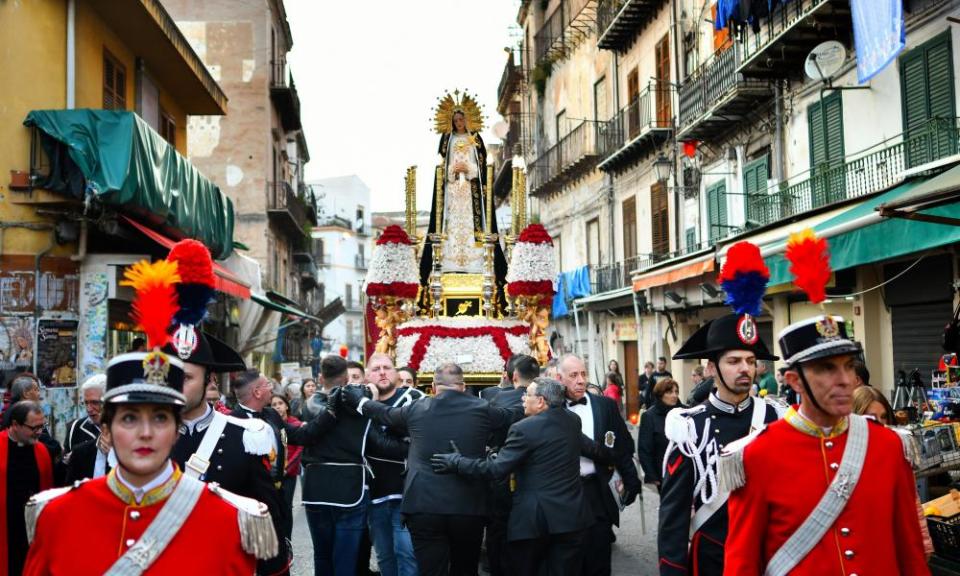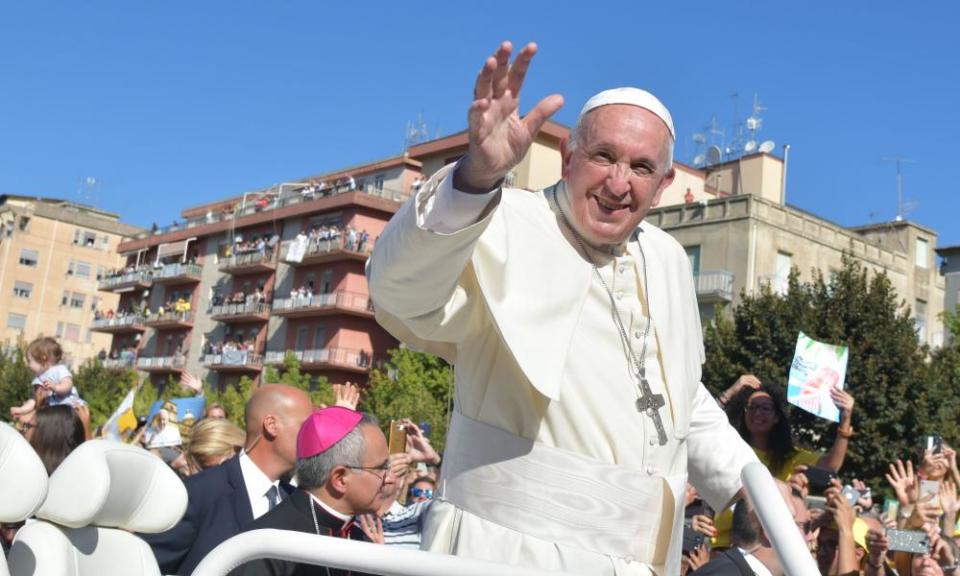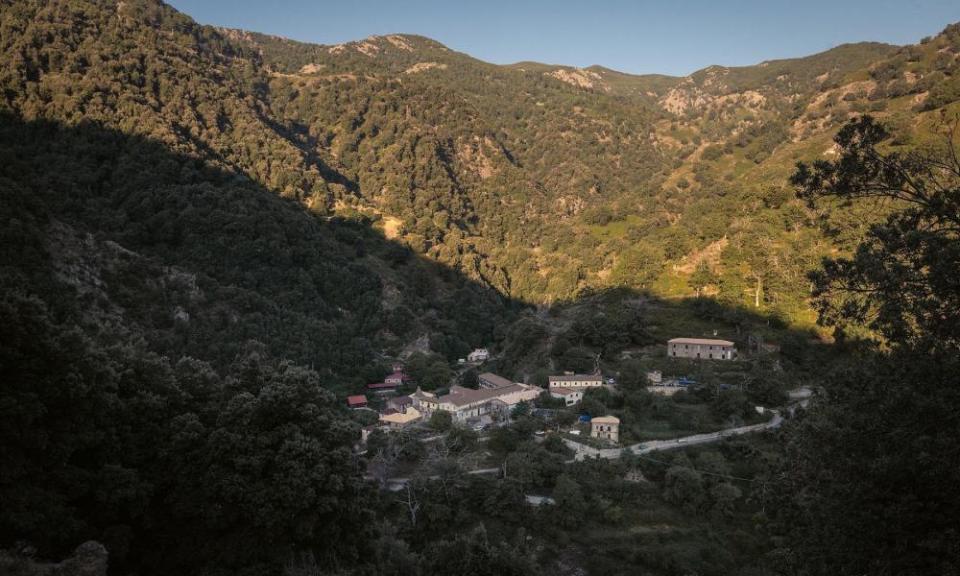Vatican fights to ‘free Virgin Mary from mafia’

Early in his papacy, Pope Francis responded to a particularly gruesome double murder in Calabria by travelling to the region and issuing a ringing condemnation of ’Ndrangheta, the local mafia-type organisation responsible. Addressing an audience of 200,000 people in June 2014, he said: “The ’Ndrangheta represents the adoration of evil and contempt of the common good … they are excommunicated.”
The following month, with the pope back in Rome, an officially sanctioned religious procession through the streets of the Calabrian town of Oppido Mamertina halted outside the home of Giuseppe Mazzagatti, a local ’Ndrangheta boss. There, a giant statue of the Virgin Mary was made to bow in homage and obedience to Mazzagatti. Outraged police officers refused to accompany the procession as it then moved on through the town.

Such acts of defiance, described by Rome as “deviant spirituality”, continue to take place. This autumn, exasperated Vatican officials have decided to mount a theological counter-offensive. With the enthusiastic backing of Pope Francis, the Pontifical International Marian Academy (Pami) has set up a new department with the title: “Freeing Mary from the mafia and from criminal powers”. The intention, said Pami’s president, Father Stefano Cecchin, is to teach and disseminate a “true theology of Mary”, disentangling acts of veneration from local networks of political corruption and mafia influence.
Speaking to the Catholic News Agency, Cecchin said that the project was ambitious, but also “a duty”. In a letter approving the project, Pope Francis wrote: “May the numerous devotees of the Virgin assume attitudes that exclude a misguided religiosity and respond instead to a religiosity correctly understood and lived. It is necessary that the style of Marian displays conform to the message of the Gospel and the teachings of the Church.”
Marian devotions, along with the veneration of local saints, have remained a feature of popular Catholic culture, both in southern Italy and parts of Latin America. The status of Mary, as the mother of God, is seen as giving her unique power to intercede on humanity’s behalf. As processions of spectacularly adorned Madonnas maintain the Virgin as a beneficent presence in communities, mafia bosses have been assiduous in maintaining a close relationship with such a powerful symbol. Often with the complicity of local priests, money from organised crime has long helped finance local religious festivals and enhance the social prestige of the clans.
According to Cecchin, the mafia exploits popular veneration of Mary to inculcate a culture of obedience to its own authority. “In the mafia framework,” he said, “the figure of Mary has become the figure of a human being who must be submissive, therefore a slave, accepting the will of God, the will of the bosses, the will of the mafia leader.”
Pope Francis is truly committed to purifying the theology of the people. We will see if it can be done
Massimo Faggioli, theologian
The “bow” during Marian processions was “a way of saying to the population that this mafia boss is blessed by God – in fact, directed by the mother of God, who stops to recognise that he is the leader, and therefore we all must obey him, as if he has a divine mandate.”
Roberto Saviano, the author of an acclaimed investigation into the Camorra, has lived under police protection since its publication in 2006, after receiving death threats from the group. “The figure of Mary is hugely important in mafia culture,” he said. “The inchino (bow) has a huge political significance. Mafiosi continue to finance these processions, and when homage is paid by the Madonna to a clan boss who has contributed money, the political message is ‘this guy works for the good of the community’.”
The association of Mary with the idea of family is, he says, crucial to her importance in the mafia imagination. “When a mafia member commits a murder, it is seen as a burden he takes on to save and defend his ‘family’. In the mafioso’s mind, Mary, defined by her status in the holy family, knows and understands this. She will be his advocate before God, explaining that what he did was for a good purpose.”

Reinforcing religious associations, the ’Ndrangheta crime group has traditionally conducted councils at the Sanctuary of Santa Maria di Polsi, in the Calabrian mountains. “Religion gives a metaphysical dignity to the squalid, violent reality of being a mafioso,” said Saviano.
Father Cecchin’s working group, which includes police officers, judges, and anti-racketeering experts, as well as theologians, will begin work in October. Massimo Faggioli, a theologian who has written extensively on Francis’s papacy, believes it is a sign of Pope Francis’s determination to end the mafia’s cultural colonisation of Catholic ritual once and for all.
“In the Italian south, it’s a complicated history,” said Faggioli, “In the postwar period, the Catholic church and the mafia were bound up in the ferocious anti-communism of the time, and Mary was the heroine of anti-communism. They were part of the same political bloc in this sense, and a blind eye was turned to some of the darker stuff. Then, in more recent years, the Church hierarchy became less interested in these kind of processions and acts of popular piety. Pope Benedict, for example, had little theological interest in Marian devotions.”
Francis, the first Latin American Pope, is different, he says. “He comes from a much more devotional Catholic tradition. He is truly committed to purifying the theology of the people. We will see if it can be done.”

 Yahoo Finance
Yahoo Finance 